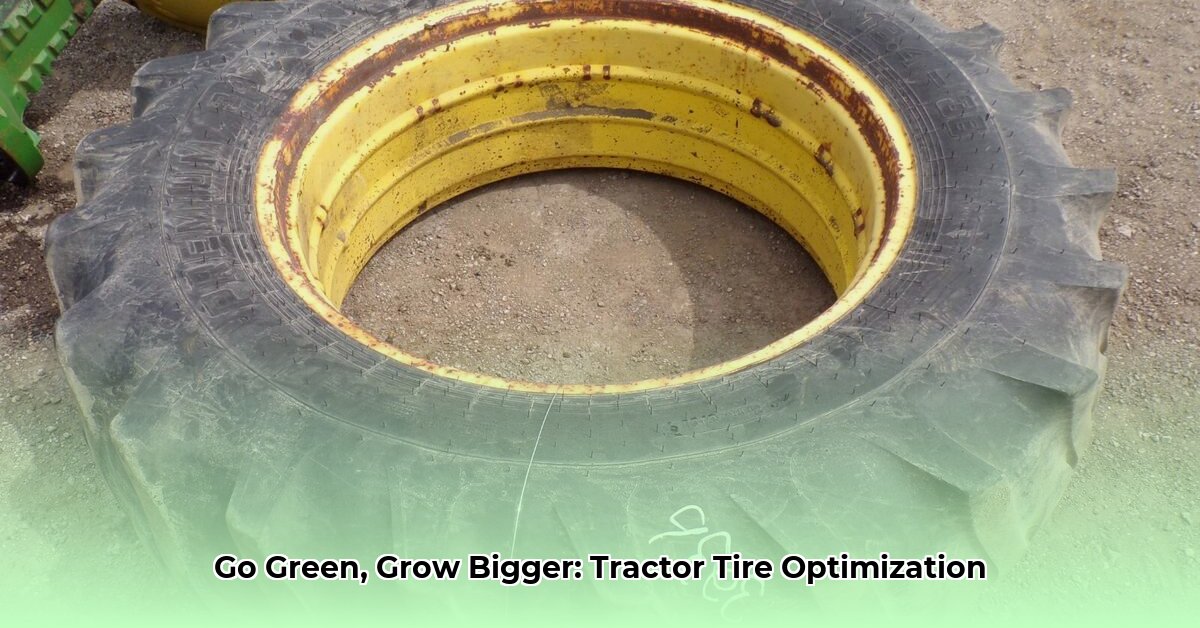
Choosing the right tractor tires significantly impacts both your farm's profitability and its environmental footprint. This guide focuses on 18.4x38 tires—a common size for mid-sized tractors—and provides actionable steps for optimizing their use in sustainable agriculture. For more tire size information, check out this helpful tire size chart.
Understanding the Environmental Impact of Tire Choice
Your tractor tires are much more than just rubber; they're a key factor in sustainable farming practices. The way your tires interact with the soil and their fuel efficiency directly affect your farm's environmental impact. Inefficient tire choices lead to increased fuel consumption, soil damage, and more frequent replacements. But smart choices? That's a recipe for a greener and more profitable operation.
Fuel Efficiency: Properly inflated tires reduce rolling resistance, leading to improved fuel economy and lower greenhouse gas emissions. This translates directly into cost savings and a smaller carbon footprint. Isn't that a goal worth striving for?
Soil Compaction: Heavy machinery compacts soil, harming plant roots and reducing water infiltration. The right tires, inflated correctly, minimize compaction, promoting healthier crops and soil structure. Studies have shown significant improvements in yield with proper tire management.
Tire Longevity: Investing in durable tires means fewer replacements, reducing resource consumption and waste associated with tire production and disposal. Longer-lasting tires save money and minimize your environmental impact––a win-win.
End-of-Life Management: Responsible disposal, such as recycling programs, keeps old tires out of landfills and minimizes the environmental burden of tire manufacturing. What responsible disposal methods are readily available in your area?
Selecting the Perfect 18.4x38 Tractor Tires: A Step-by-Step Guide
Choosing the ideal 18.4x38 tire involves a thorough assessment of your farm's unique conditions. Follow these steps for optimal results:
Step 1: Assess Your Farm's Conditions
Soil Type: Sandy, clay, or loam? Soil type dictates the necessary tread pattern and tire construction for optimal traction and minimal compaction. Deeper treads often perform better in clay soils.
Crops: Some crops are more sensitive to soil compaction than others. Root vegetables, for example, require minimal soil disturbance.
Operating Conditions: Do you work in wet or dry conditions? Aggressive treads are beneficial in wet conditions, while shallower treads better suit dry, firm ground.
Step 2: Deciphering Tire Specifications
Tread Pattern: Deep treads offer superior traction in wet fields but may cause more soil compaction. Shallower treads are gentler on the soil but may exhibit lower traction in muddy conditions.
Tire Construction: Radial tires generally provide better fuel efficiency and a smoother ride than bias-ply tires, which are often known for their durability. Balance these factors when making your decision.
Quality and Durability: While higher-quality tires involve a higher upfront investment, their longer lifespan and superior fuel efficiency often make them a more cost-effective choice in the long run. Have you considered the long-term costs versus immediate savings?
Step 3: Making Your Decision
Carefully weigh the pros and cons of different tire options based on your specific farm needs. There is no single perfect answer; the best tire selection depends on your unique circumstances.
| Feature | Radial Tires | Bias-Ply Tires |
|---|---|---|
| Fuel Efficiency | Generally better | Typically lower |
| Ride Comfort | Smoother | Rougher |
| Durability | Varies depending on the design | Usually more durable |
| Cost | Usually higher upfront | Typically lower upfront cost |
| Soil Compaction | Generally lower, but dependent on other factors | Potentially higher |
Maintaining Your 18.4x38 Tires for Longevity
Proper tire maintenance is essential for maximizing their lifespan and minimizing environmental impact.
Regular Pressure Checks: Underinflation is a leading cause of premature tire wear and increased fuel consumption. Maintain the recommended tire pressure as specified by the manufacturer for your specific tires and operating conditions.
Routine Inspections: Regularly inspect your tires for cuts, punctures, or uneven wear. Addressing small issues promptly can prevent larger, more costly repairs down the line.
Appropriate Storage: When not in use, store your tires in a cool, dry location, off the ground and shielded from the elements.
Responsible Disposal: Utilize designated tire recycling programs to minimize landfill waste and reduce the environmental impact of tire production.
The Long-Term Value of Sustainable Tire Choices
Investing in high-quality 18.4x38 tires delivers long-term savings and environmental benefits. By reducing fuel consumption and extending tire life, you significantly lower operating costs and minimize your farm's environmental footprint. While the initial investment might be higher, the sustained cost savings and environmental benefits make it a strategic choice for sustainable farming.
Emerging Technologies in Sustainable Tire Design
The agricultural tire industry is constantly innovating. Researchers are actively developing bio-based rubber alternatives and advanced tread designs that offer improved traction, fuel efficiency, and reduced environmental impact. Staying informed about these advancements will allow you to make the most eco-friendly choices for your operation. The future of sustainable farming looks bright, and tire technology is playing a leading role.